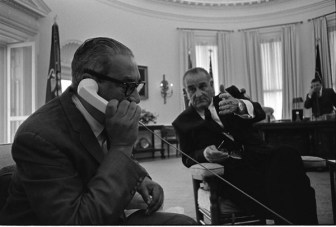Today’s guest post comes from David Coleman, associate professor at the University of Virginia and Chair of the Presidential Recordings Program at the Miller Center of Public Affairs.
On April 28, W.W. Norton will publish volumes 7 and 8 in the Miller Center’s Presidential Recordings of Lyndon B. Johnson series. (The original tapes are in the holdings of the LBJ Presidential Library and Museum.) The volumes, which span June through July 4, 1964, were edited by Guian McKee, Kent Germany, and David Carter.
At 7 p.m. on Thursday, April 28, the National Archives will host Dave Coleman, the editors, and Pulitzer Prize–winning author Taylor Branch to discuss these latest books.

“That’s a good bill, and there’s no reason why you ought to keep a majority from beating it. If you can beat it, go on and beat it, but you oughtn’t to hold it up. You ought to give me a fair shake and give me a chance to vote on it.”
—LBJ to House Minority Leader Charles Halleck, 6:24 p.m., June 22, 1964
Behind-the-scenes discussions between the White House and Capitol Hill can be an essential piece of the puzzle in understanding how and why legislation was passed, rejected, or changed, or even a government shutdown averted. But they’re typically obscured from public view.
It’s easy enough to imagine what might have been said in those conversations, but it’s very hard to know. The people involved usually have lots of incentive to stay tight-lipped, so this crucial aspect of how the nation’s government works can get lost in a historical blind spot.
Most of the time, that is. Thanks to LBJ’s tapes—about 800 hours of secretly recorded telephone calls—we have a rare opportunity to eavesdrop on this critically important aspect of the legislative process. And we also get to hear, in real time and unfiltered, the information and advice that flows back and forth along Pennsylvania Avenue.
Just as JFK often behaved as his own Secretary of State, LBJ often acted as a one-man Office of Legislative Affairs. Uniquely experienced in the ways of the Hill, he took an exceptionally close interest. In June 1964, for example, he was personally monitoring closely the progress of 31 pieces of legislation during an exceptionally busy and important legislative period.
And he showed no hesitation in engaging his former colleagues directly. The famous Johnson treatment, it turns out, didn’t have to be dispensed in person; LBJ became a master of using the telephone as an instrument of national policy, and on the tapes we get to hear LBJ in full flight, making the case for or against a bill, providing blunt advice on the scheduling of votes, wheeling and dealing to secure votes, briefing congressional leaders on foreign trouble spots, sounding them out for advice, and even monitoring votes on raising the debt ceiling.
Senator Richard Russell, Charlie Halleck, Carl Albert, Hubert Humphrey, Edward Kennedy, and Adam Clayton Powell and many leading congressional figures of the day were captured on tape, all unknowingly.
We also get to hear, in real time, LBJ learning the fate of some of the most important legislation of the era.
When the Civil Rights Act of 1964 passed the Senate on the evening of June 19, 1964, Johnson was in a suite at the Fairmont Hotel in San Francisco, having flown out that morning. “Wonderful, wonderful. 73!” he says when he first hears the news from Larry O’Brien of an overwhelming majority. In the hours following, he reached out by transcontinental telephone calls to Civil Rights leaders to share the news and congratulate them. “It was a good day for all of us,” he tells National Urban League Executive Director Whitney Young.
There is much about LBJ’s tapes that is fascinating and illuminating, but the behind-the-scenes view of the political rough and tumble from opposite ends of Pennsylvania Avenue is unique.
